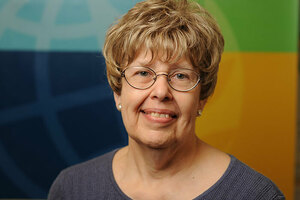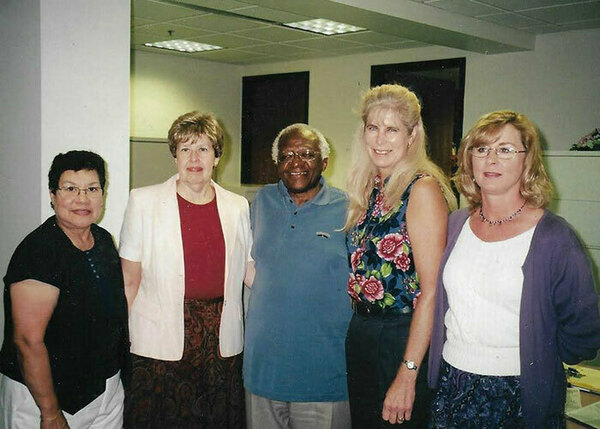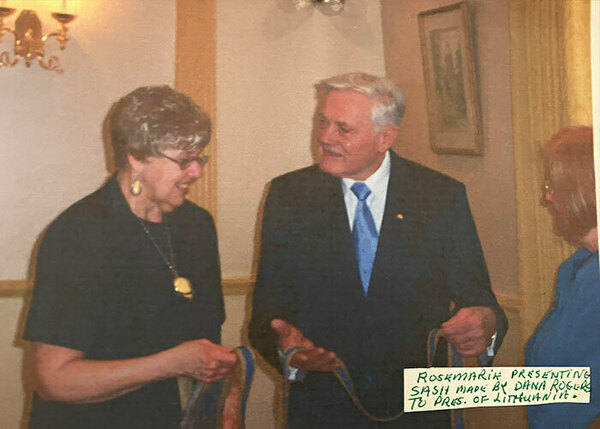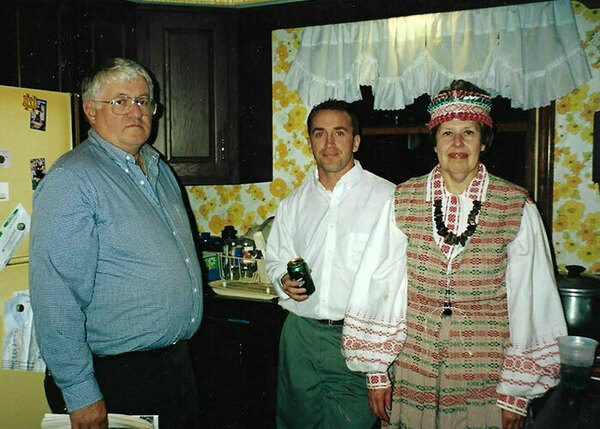
The Kroc Institute for International Peace Studies mourns the passing of Rosemarie Green, a pillar at the Institute for 24 years since its launch at the University of Notre Dame in 1985. Green died on August 5, 2023.
“Rosemarie’s ethics, efficiency and kindness embodied the work and mission of the Kroc Institute,” said Asher Kaufman, John M. Regan, Jr. Director and professor of history and peace studies. “Her dedication to our students–in particular, our international students–reflected the vision of our founders, Fr. Theodore M. Hesburgh and Mrs. Joan B. Kroc. Her generous smile welcomed and farewelled every person who entered and left the building.”
 Rosemarie (second from left) enjoyed meeting the many visitors to the Kroc Institute, including Nobel Peace laureate Archbishop Emeritus Desmond Tutu (center)
Rosemarie (second from left) enjoyed meeting the many visitors to the Kroc Institute, including Nobel Peace laureate Archbishop Emeritus Desmond Tutu (center)
Involved in the administration of the graduate and undergraduate academic programs, Green played a vital role in the Institute's developmental years and made a lasting impact on the lives of students who came from diverse backgrounds and countries to study at Notre Dame. She was known for her welcoming nature and her commitment to helping foreign students adjust to life in the United States.
“Rosemarie was the Kroc Institute before it became the Institute we know today, and she was one of a handful of dedicated staff with a spirit of service and hospitality that set the standard and tone for the years that followed,” said R. Scott Appleby, Marilyn Keough Dean of the Keough School of Global Affairs and former director of the Kroc Institute. “Notre Dame and the Kroc Institute owe a debt of thanks to her and her colleagues who shaped those early years.”
“I can’t express how central ‘Mother Rosemarie,’ as the students often called her, was to our holding all tentative parts of the enterprise together in the first decade of the Kroc Institute’s inception,” said George A. Lopez, Rev. Theodore M. Hesburgh, C.S.C. Professor Emeritus of Peace Studies. “Far beyond her care for the students, she navigated administrative hurdles with ease, especially in establishing the undergraduate concentration and how the Registrar would post Kroc Institute courses–a new interdisciplinary leap in the late 1980s.”
 Rosemarie presenting a sash to the 5th and 7th President of Lithuania, Valdas Adamkus
Rosemarie presenting a sash to the 5th and 7th President of Lithuania, Valdas Adamkus
Green’s contributions extended beyond administrative work; she considered students as extended family. With her husband and three children–all Notre Dame graduates themselves–she opened their home to students who couldn't return to their native countries during campus breaks, providing them with a sense of belonging and care. Green’s support went beyond academic matters, as she helped students navigate cultural differences and provided practical assistance, like teaching them how to use computers and word processing software.
“Rosemarie invited me to her home for the holidays. We shared a love for cooking, dancing and promoting cultural origins,” remembers Rosette Kawaaluko Muzigo-Morrison (M.A. ‘93). “When I came to Notre Dame, I had never gone near a computer or typewriter, so when I was asked to submit my first assignment, typed, Rosemarie was the obvious choice to turn to. She gave me a quick rundown of how to create a Word document and save it.”
Green’s passing has elicited tributes and memories from numerous alumni of the Kroc Institute, representing over 35 countries across Europe, Africa, North and South America, and Asia, including Turkey, Israel, Vietnam, Germany, Sri Lanka, Russia, India, and many more. Her genuine care, contagious smile, and welcoming demeanor left a lasting impression on those who knew Green.
“Rosemarie lived the philosophy of the Kroc Institute and contributed immensely to all our learning and living at Notre Dame,” said SP Udayakumar (M.A. ‘90). “The kindhearted and ever-smiling Rosemarie was there for us at the Institute all the time. She helped us enormously in our settling down at Notre Dame and in the U.S., and made us all feel at home.”
Christine Birabwa-Nsubuga (M.A. ‘03) shared that in “Coming to America from Africa for the first time, Rosemarie helped me to overcome many cultural shocks I got along the way. I can still hear her gentle voice encouraging me.”
“What a precious gift we had with Rosemarie at the Kroc Institute, and her warm and loving perspective,” added Silke Denker (M.A. ‘07). “She made a huge difference to foreign students like me when we settled into our new environment. Rosemarie was always so helpful, and her door was always open to whatever our needs and concerns were.”
Green was proud of her Lithuanian heritage, and easily connected with international students. As a student from Lithuania, Diana Vaskeviciute Smith (M.A. ‘93) felt especially fortunate to have found Green at the Kroc Institute.
 Rosemarie and husband, Thomas (far left) loved hosting multicultural dinners at their home
Rosemarie and husband, Thomas (far left) loved hosting multicultural dinners at their home
“Rosemarie was a constant in my life while I was at Notre Dame, sharing generously of her time, resources, and making me a part of her family. She introduced me to her American Lithuanian friends in the area, and we went to Chicago to participate in Lithuanian gatherings.”
“Rosemarie was the first person who helped and supported me when I arrived in the United States,” said Frieda Dahdah Khayat (M.A. ‘00). “She showed great love to my two children and was a very caring friend of the family. I adored and respected her like my mom.”
Binnur O. Taner (M.A. ‘99) remembers Green as being “so good to me when I first arrived on campus in 1988. I have always remembered her smiling face and graceful presence in many of the Kroc events I participated in during my time at Notre Dame.”
Added Maite P. Gallego (M.A. ‘89), “If the world were populated with people like Rosemarie, we would have world peace.”
Robert C. Johansen, professor emeritus of political science and peace studies, recalled fondly his close working relationship with Green over almost two decades, and reiterated how important her influence was on the Kroc Institute.
"Rosemarie played an essential and uplifting role in the Institute’s formative years,” he said. “She radiated loving kindness, patience, and dignity in every relationship. She was hard-working, resilient, ethically sensitive, and a wonderful example for us all of how to ‘be peace' as well as to work for peace. She was a friend to all, students and faculty alike, and reached out to everyone in ways that brought forth their best self. She helped shape our way of doing business with sensitive interpersonal relationships. Over time, this influenced our entire program. Serving students and faculty doing peace education was her mission in life during her years of service to the Kroc Institute."
Green retired from the Kroc Institute in 2009 to enjoy time with family, but continued to share her warmth and generosity with others, remaining active in her local parish and genealogical society.
“The Kroc Institute owes a debt of gratitude to Rosemarie for the compassion and attention to detail, which supported so many students over the years,” said Anne E. Hayner, associate director for alumni relations at the Kroc Institute. “Her influence was foundational, and will reverberate into the future.”